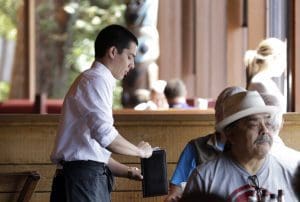Majority of LGBTQ people support efforts to contain coronavirus over reopening economy
Eighty percent of LGBTQ people believe it’s more important to stop the virus in its tracks than to get back to business as usual.

As the coronavirus death toll nears 187,000, a larger share of LGBTQ people compared to the general population say that it’s more important to save lives over reopening the economy.
New data from the Human Rights Campaign and PSB Research shows that even before states initiated policies to open amid the pandemic, 78% of LGBTQ people said they preferred containing the virus to reopening, as opposed to 73% of the general population.
That figure rose to 80% among LGBTQ people after some states began opening up again. Among the general population, however, that number dropped to 69%.
The data was taken from polls completed between April 16 and August 6.
LGBTQ people face increased risks as states reopen because many have health conditions that put them at higher risk of complications from COVID-19.
An April study from the Williams Institute found that 208,500 transgender adults have asthma, 81,100 have diabetes, 74,800 are living with HIV, and 72,700 have heart disease. Sixty-five percent of LGBTQ adults, compared to 51% of the general population, have pre-existing conditions, including HIV, diabetes, asthma, and heart disease.
LGBTQ people are also continuing to struggle economically as states reopen, which advocates say is indicative of how the community is often left behind in the policy response to the pandemic.
LGBTQ people were 20% more likely than the general population to have had their work hours reduced since states began reopening in late May, according to the Human Rights Campaign and PSB Research. LGBTQ people of color specifically were 44% more likely to experience reduced work hours, and transgender people were 125% more likely.
The data this week also revealed that queer and trans people are more likely to continue to experience pay cuts. Since May 26, LGBTQ people were 50% more likely and LGBTQ people of color were 150% more likely than the general population to have experienced a cut in their pay.
Nearly one-fifth of bisexual people have become unemployed since May, a slight increase from before states began to reopen.
In addition to the pay cuts and reduced work hours, LGBTQ people have been forced to take unpaid leave for reasons that they say are related to the pandemic.
Although the percentage of the general population taking unpaid leave since states began reopening has fallen by 14%, the share of people taking unpaid leave has increased in parts of the LGBTQ community: LGBTQ people of color’s use of unpaid leave has increased by 23% and transgender people’s has risen by 4%.
Alphonso David, president of the Human Rights Campaign, stated on Friday that officials at the state and local level should act to protect LGBTQ people from hardship, given the most recent data.
“Without leadership from the highest office of the land, we must make sure that elected officials at all levels are ensuring that LGBTQ people, especially the members of the community who are living at the intersections of multiple marginalized identities, receive the support they need,” David said.
Ty Cobb, the Human Rights Campaign Foundation’s senior director of strategic initiatives and research, said that people of multiple marginalized identities are “consistently at greater risk.”
Cobb noted that many LGBTQ people of color and transgender people work in frontline industries, which includes retail workers, restaurant workers, and hospitals — some of which are low-wage jobs and lack benefits like paid leave or health insurance.
“As a result, LGBTQ people of color and trans people are likely having to take unpaid leave either to protect their health or the health of a loved one,” Cobb said. “It’s another example of how the most vulnerable often do not have the resources they need to survive, especially amidst an ongoing public health crisis.”
Published with permission of The American Independent Foundation.
Recommended

Biden calls for expanded child tax credit, taxes on wealthy in $7.2 trillion budget plan
President Joe Biden released his budget request for the upcoming fiscal year Monday, calling on Congress to stick to the spending agreement brokered last year and to revamp tax laws so that the “wealthy pay their fair share.”
By Jennifer Shutt, States Newsroom - March 11, 2024
December jobs report: Wages up, hiring steady as job market ends year strong
Friday’s jobs data showed a strong, resilient U.S. labor market with wages outpacing inflation — welcome news for Americans hoping to have more purchasing power in 2024.
By Casey Quinlan - January 05, 2024
Biden’s infrastructure law is boosting Nevada’s economy. Sam Brown opposed it.
The Nevada Republican U.S. Senate hopeful also spoke out against a rail project projected to create thousands of union jobs
By Jesse Valentine - November 15, 2023








































































